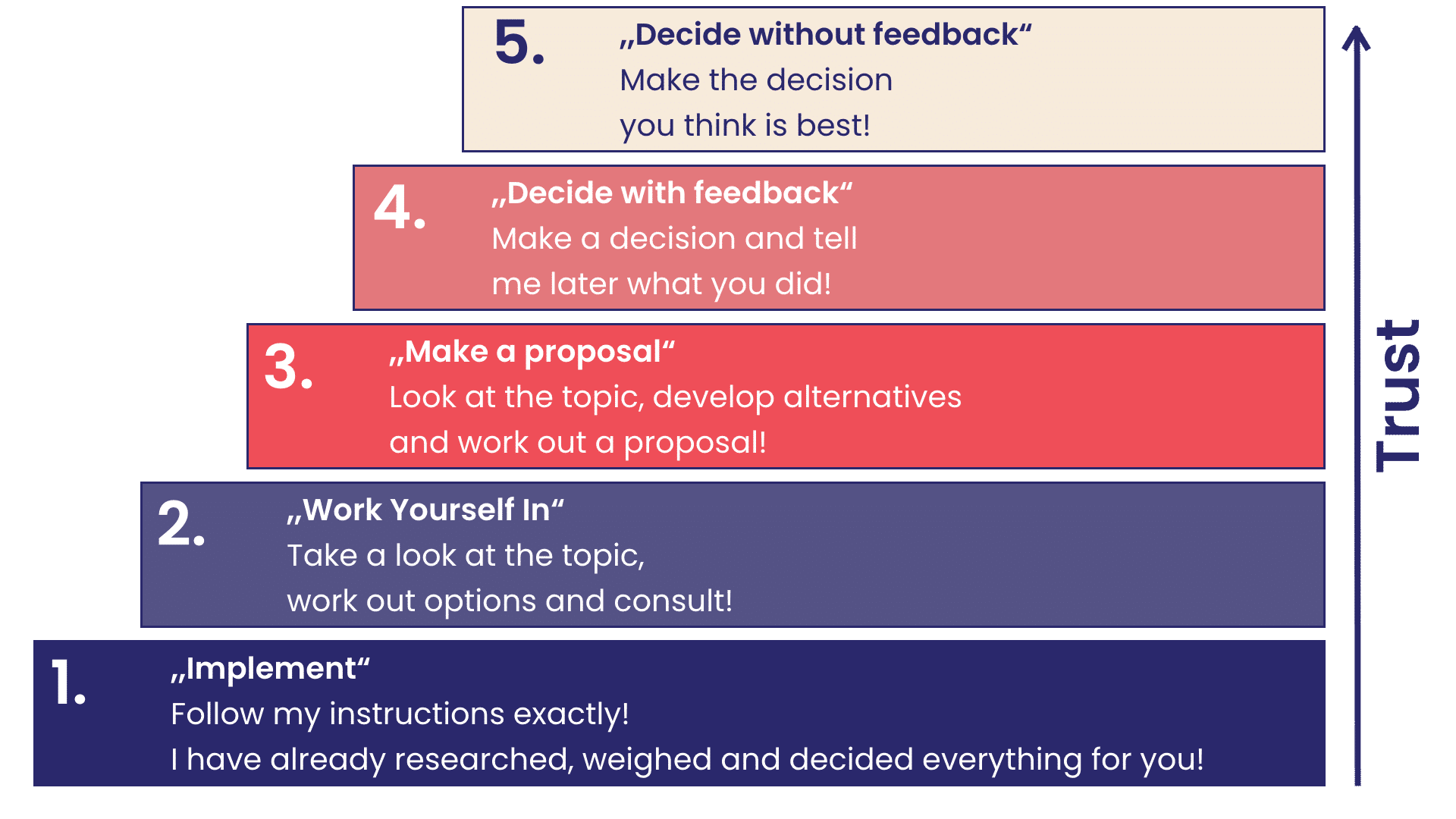Delegation is a central topic in leadership and represents a basic competence of good leaders. Unfortunately, for many leaders, delegating tasks often looks like this: Forwarding the task in a short Teams message, tapping fingers on the table and waiting for the backlash.To make things different for you, we’ve put together a few tips on the subject:
How does delegation work?
In management, delegation means handing over areas of competence and responsibility to employees. Management by delegation is the associated concept in the management process. In this management technique, superiors usually delegate recurring or similar tasks to employees.
What to consider:
- Define the scope of the respective tasks, and milestones if necessary, in advance.
- Assign employees the corresponding powers of representation and rights to issue instructions for the fulfillment of these tasks.
- Leave the operational work to the respective employees and concentrate on controlling the results.
Deciding which tasks can be delegated to whom depends on how much you trust that particular team member. This can be represented visually in the 5 levels of delegation:
With each level, the confidence of the leader increases and with it the degree of freedom of the employees. It is the responsibility as a leader to find the right balance between possible under- and overload, since delegation always needs to be done situationally and individually.
- New team members are usually on the 1st level, as they first have to learn the ropes: they are given concrete instructions on what or how to do.
- If you ask an employee to develop a solution proposal or alternatives on her own, then we are talking about level 3. The person does not get a briefing in advance, because you trust her to deal with the topic conscientiously.
- The most pronounced level of delegation is reached when a person is given a task completely. The level of trust is such that any decisions can be made independently and no feedback is required.
Your advantages through delegation
Handing over tasks always sounds good per se, and it is: proper delegation offers added value for leaders and employees!
💡 Delegation promotes the self-motivation of employees. They become more active and there is increased communication across teams and departments.
💡 In addition, rigid decision-making powers and hierarchies are eliminated, as the decision-making authority and personal responsibility of employees increases.
💡 The necessary involvement of the team in achieving corporate goals results in a strengthened commitment of the employees to the company.
💡 Leaders are relieved and can use the freed-up capacities for other leadership tasks.
The framework for successful delegation
When a task is delegated, the aim is to ensure that it can be completed in a meaningful and goal-oriented manner. To achieve this, a few framework conditions need to be clarified, which we have summarized below:
- Who exactly takes over the task or who bears the main responsibility? And may further delegation be made?
- By when must the task be completed?
- What is to be done? Are there intermediate goals?
- Why does the employee have to do this?
- What should the procedure be?
- What resources (time, budget, etc.) can be drawn upon?
- Say thank you! (because appreciation & respect is part of it)
These frameworks provide clarity and define mutual expectations. For example, it becomes clear why a person receives this task (resources, expertise,..) or how the process takes place (milestones, coordination,..). The levels of delegation can also be found here: the more responsibility the person receives, the less control should be noticeable on the part of the leader.
In the course of delegation, it is important to involve the employees in the distribution of tasks. There should be no under- or overload – the person should feel comfortable with the implementation and, in the best case, be happy about the task and the appreciation.
Are you ready to delegate your tasks?
Great, we wish you good luck! 🎉 As a support you can download the delegation matrix HERE for free. It helps you to classify your tasks and to delegate the right ones!
If you have further questions about delegation or need support, feel free to get in touch! 👇
Roland Mayer
Email: roland.mayer@leaders21.com
Link to profilepage


